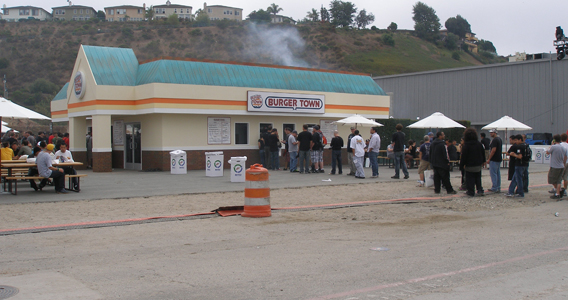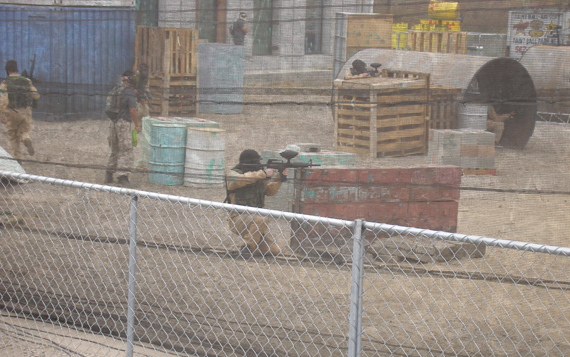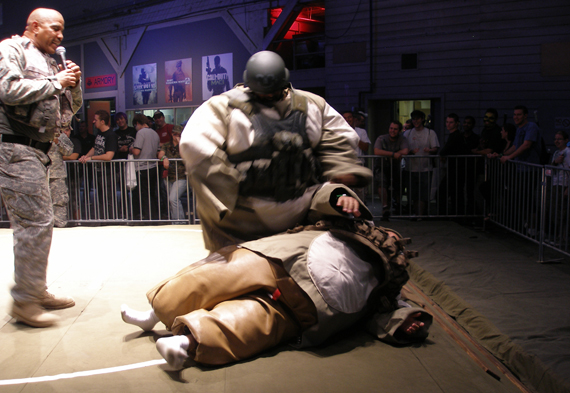
I arrived at Call of Duty XP unprepared for the level of loyalty the series commands, and the nature of that loyalty; if you had asked me a year ago, I might have questioned whether the fanbase was really there. Not in terms of scale, of course, but in terms of investment—everyone (almost literally) plays Call of Duty, but does it control the type of entrenched fan that seeks (or demands) an experience like this?
I wondered what niche XP filled, what need it answered.
Or, to put it another way: a lot of people watch Survivor, just like a lot of people watch Star Trek—but you can’t really have a Survivor convention the way you can have a Star Trek convention—it can’t be leveraged that way, and it doesn’t need to be. I thought Call of Duty the same.
Turns out I was wrong.

The show opened with a video package showcasing the lifeblood of Call of Duty—a montage of the bombastic set pieces that are a hallmark of the series. Explosions, ziplines, breaking glass, throwing knives and pounding music; the enthusiasm of the audience became a pulse that was impossible not to feel.
Adherence to Call of Duty feels very different from the reverence for a series like Halo—the hardest of the hardcore are invested in the lore of Halo; they’re talking about Spartans and Shield Worlds and the deep, foundational mythology of that universe—but the conversations I’ve heard from Call of Duty fans this weekend have been a little different, as is the way Activision presents the product.
Perks, maps, killstreaks—that’s the dialogue of COD.
Nobody is talking about what Soap McTavish is going to do next—the conversation is always about mechanics, about balance, about attachments and game modes and progression systems, and all those little COD-isms.
The franchise has become, for its disciples, pure game. There’s nothing to talk about but game, and it’s an interesting condition—almost the stark opposite of the way some other franchises have made their name with engrossing lore and world-building.

COD XP is a direct expression of this condition, with almost every attraction an attempt to pull those gameplay moments into the real world, to make the game tangible.
Out in the open, with patrons lined in a forty-minute wait, stands Burgertown—a nigh-perfect recreation of the besieged MW2 restaurant, and the closest thing to lore Activision chose to leverage. And that recreation advertised to me that Activision understand that the attachment their fans have to the series lies elsewhere.
It’s the investment in the visceral that makes Call of Duty, and that’s what XP is about. You go to ride the zipline, to strap on Juggernaut armor, and to run the Pit. You go to drag those small, self-contained elements of gamplay into sharp, physical dimension.
I played paintball on an MW2 multiplayer map brought to life, and I ran a replica of the Pit from that same title—and I understood that Activision had achieved something unique. I’ll never ride a bomb through space like the Master Chief, but I was able to run that pit, drop twenty eight targets in twenty eight seconds, and I’ll never forget that. They took a part of that series—one of my favorite parts of Modern Warfare, truth be told—and made it real, burned it into my brain for all time.
In a lot of ways, Call of Duty isn’t a franchise built for me—it doesn’t have the mythology and the material that I crave. XP, though, was an eye-opening experience, illuminating the reason I and a million other players keep coming back year after year.
When the event opened, Activision CEO Eric Hirshberg talked about Call of Duty being the ultimate fan event for the ultimate fans—and I didn’t really grasp that offering until I was running and gunning my way through the pit. I may not be the ultimate Call of Duty fan, but what XP does is done so well, so tangibly, that even the casual fan is going to walk away thinking “Fuck yeah, Call of Duty!”